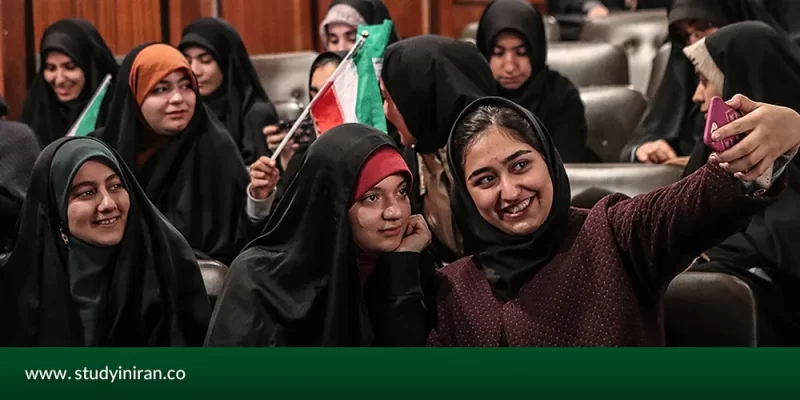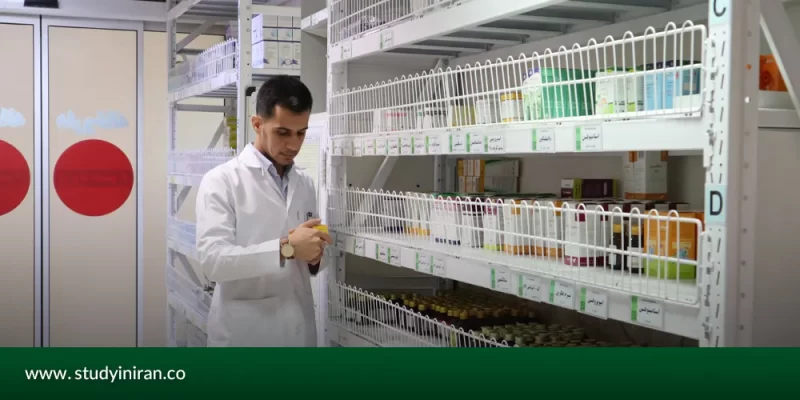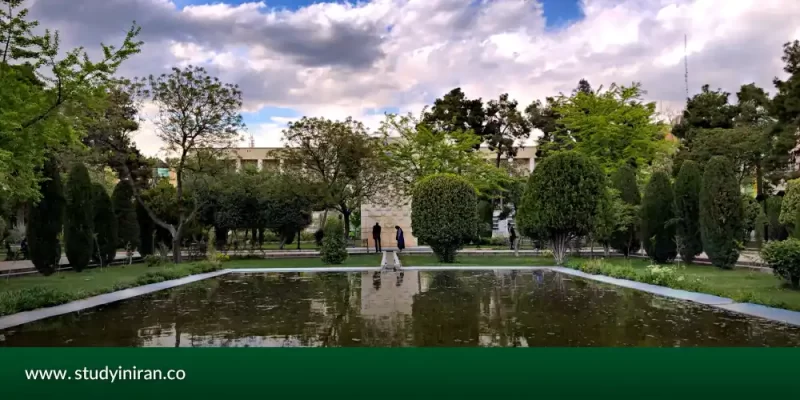- Benefits of Study Online in Iran
- Admission Requirements for Graduate Programs in Iran
- Key Features of Online Study in Iran
- Online Tuition Fees for International Students in Iran
- Required Documents for Online Study in Iran
- Online Master’s Programs in Health – Tehran University of Medical Sciences (TUMS)
- Accredited Online Universities in Iran
- Final Thoughts
- Frequently Asked Questions (FAQs)
In recent years, online education has grown rapidly in Iran as a modern and flexible approach to learning. Today, a number of Iranian universities offer short-term online programs that are fully remote and accessible to international students.
These courses are highly affordable and, thanks to their online format, allow students to balance studies with work or everyday life. Admission dates are flexible, enabling applicants to enroll without being tied to a strict academic calendar.
Unlike traditional on-campus programs, most short-term online courses in Iran have minimal entry requirements, making it easy for students to join without extensive paperwork or competitive exams. Some universities even provide selected courses free of charge, offering an excellent opportunity to gain new skills at little or no cost.
Benefits of Study Online in Iran

1. Flexibility in time and place
Online programs give students access to learning materials anytime, anywhere—without the need to attend classes in person. This flexibility is especially valuable for those with jobs or family commitments.
2. Lower living and commuting costs
By removing the need to relocate or travel daily, students save significantly on housing, transportation, and meals, making online study a more affordable alternative to on-campus education.
3. Wide range of courses and disciplines
Many Iranian universities now offer a broad selection of online programs, from humanities and the arts to engineering and the sciences. This variety allows students to choose programs that best match their interests and career goals.
4. Use of modern learning technologies
Virtual classrooms are supported by learning management systems, video conferencing, and online discussion forums. These tools create an interactive experience that closely mirrors in-person learning.
5. Easier admission compared to on-campus study
Most online courses have simpler entry requirements and do not demand extensive documentation or competitive exams, making higher education more accessible.
6. Study while working
Perhaps the greatest advantage is the ability to continue education while maintaining employment. Students can earn a degree or professional certification without interrupting their career path.
Admission Requirements for Graduate Programs in Iran
To be admitted to graduate-level studies in Iran, applicants must meet a set of specific requirements:
Academic Background
- A recognized bachelor’s degree (B.A. or B.Sc.) from an accredited university is mandatory.
- Applicants must have earned a minimum GPA of 12/20 (or equivalent) at the undergraduate level.
- The selection process considers academic records, research background, published papers, and academic achievements. In some cases, applicants may also be required to attend a subject-related interview.
English Language Proficiency
Since many graduate programs involve advanced academic resources in English, applicants are expected to demonstrate strong command of the language. This requirement can be met in the following ways:
- Native speakers of English, or those who have completed previous studies in English, are exempt from submitting test scores.
- Other applicants must provide proof of proficiency through one of the following minimum test scores:
- IELTS: 5.5
- TOEFL PBT: 510
- TOEFL iBT: 64
- UTEPT: 60
- MSRT: 60
These standards are in place to ensure that students can fully engage with course materials and participate effectively in academic discussions throughout their studies.
Key Features of Online Study in Iran

- Language of instruction: All classes are delivered in English, ensuring that international students can easily follow the coursework.
- Accredited certification: Upon completion, students receive an official certificate from the University of Tehran, which is recognized for admission to PhD programs (both on-campus and online).
- Curriculum design: Courses and credit requirements are aligned with the official academic programs approved by the University of Tehran.
- Class attendance: Online sessions are held throughout the week, and attendance is mandatory.
- Academic calendar: Programs follow the official academic calendar of the University of Tehran.
- Transfer policy: Students enrolled in this program are not eligible to transfer to other universities or campuses.
Online Tuition Fees for International Students in Iran
Faculty of Humanities and Social & Behavioral Sciences
- Persian Language and Literature: €690 per semester. For additional family members enrolled simultaneously, the fee is reduced to €510 per semester.
- Other disciplines: €1,020 per semester. For additional family members, the fee is reduced to €750 per semester.
Other Faculties and Programs
- Tuition is €1,290 per semester. For additional family members, the fee is reduced to €950 per semester.
Students may also apply for Iranian scholarships or financial aid packages, some of which are available for online programs. For detailed guidance, applicants are encouraged to contact Study in Iran and consult with academic advisors about scholarship eligibility.
Important Notes
- Students required to take prerequisite courses must pay additional fees as determined by the admissions committee.
- Tuition fees are non-refundable in cases of withdrawal or cancellation of enrollment.
- Students on academic leave are required to pay the fixed tuition fee for one semester.
Required Documents for Online Study in Iran

- Academic degree: A recognized bachelor’s degree (B.A. or B.Sc.) from an accredited institution at the time of enrollment.
- Application form: Completed online application form.
- Recommendation letters: Two scanned letters of recommendation from professors or professionals who can verify the applicant’s academic ability.
- Transcripts: Official academic transcripts, translated into English and submitted as scanned copies.
- Passport: Scanned copies of the main pages of a valid passport (for online study in Iran, only identity details are required—no student visa is necessary).
- Photograph: A recent passport-sized photo of the applicant.
- Proof of English proficiency: A valid English language certificate meeting the program’s requirements.
Important reminder: Any missing or incorrect information in the application process will result in disqualification from admission.
Key Admission Notes
- Applicants are fully responsible for the accuracy and authenticity of all submitted documents.
- Incomplete, irrelevant, or inconsistent documentation at any stage will result in cancellation of admission, and fees will not be refunded.
- Each applicant may apply to only one program of study.
- Candidates who do not meet the minimum academic requirements during the initial review will not be invited to subsequent stages.
- The launch of each program is contingent upon sufficient enrollment of qualified applicants.
- Applicants who have not yet received their final degree must provide an official temporary certificate indicating GPA and completed credits.
- If the applicant’s undergraduate major differs from the intended graduate field of study, prerequisite courses may be required, along with the corresponding tuition fees.
Online Master’s Programs in Health – Tehran University of Medical Sciences (TUMS)
1. Health Education and Health Promotion (Online, Full-Time)
This fully online master’s program focuses on both theoretical and practical training in individual and community health promotion. The annual tuition fee is approximately €10,883. While the exact duration may vary, the program equips graduates with the skills to design, implement, and evaluate health promotion initiatives at national and international levels.
2. Nutritional Medicine (Online, Part-Time)
Delivered fully online over a period of around three years, this part-time program also carries an annual tuition of €10,883. Nutritional medicine goes beyond traditional clinical nutrition, exploring the role of diet in health, disease prevention, aging, and the life cycle. Graduates are prepared for advanced roles in public health, clinical practice, and related fields.
3. Global Health (Blended, Full-Time)
This two-year full-time program combines online learning with on-campus sessions. Tuition is approximately €10,883 per year. With a multidisciplinary approach, the program emphasizes improving population health worldwide and reducing health inequalities. Students gain both academic knowledge and practical experience through research projects and applied learning.
Accredited Online Universities in Iran

In recent years, online education in Iran has grown significantly, with many leading universities establishing virtual campuses and e-learning platforms alongside their traditional on-campus programs. These institutions provide opportunities for both domestic and international students to pursue bachelor’s and master’s degrees fully online.
Virtual Universities – Bachelor’s Level
- E-Learning School, Shiraz University
- Virtual Graduate Studies, Amirkabir University of Technology
- Online Programs, Shahid Beheshti University
- Virtual Learning System, Ferdowsi University of Mashhad
- E-Learning Center, Iran University of Science and Technology
- E-Learning Center, University of Tehran
- Office of Online and Continuing Education, Khajeh Nasir al-Din Tusi University of Technology
- Isfahan University of Technology Virtual Campus
- Imam Khomeini International University (Virtual Programs)
- Sahand University of Technology (Virtual Programs)
- Virtual Education Center, Mashhad University of Medical Sciences
Private & Specialized Online Institutions – Bachelor’s Level
- Iran International University
- Quran and Hadith Non-Profit University (Qom)
- Mehr Alborz University
- Noor Tooba Virtual Higher Education Institute
- Faculty of Virtual Islamic Studies and Culture
- Islamic Azad University – Online Unit
- Jamiat al-Mustafa International University (Virtual Programs)
- Iranian Online University
- Rayan Institute of Higher Education (Tehran)
- Virtual Learning Platform of the Iranian Biotechnology Association
- Navid Virtual Learning System
Virtual Universities – Master’s Level
- E-Learning School, Shiraz University
- Virtual Graduate Studies, Amirkabir University of Technology
- Virtual Learning System, Ferdowsi University of Mashhad
- E-Learning Center, Iran University of Science and Technology
- E-Learning Center, University of Tehran
- Payame Noor University (Online Programs)
- Online Programs, Shahid Beheshti University
- Faculty of Virtual Islamic Studies and Culture
- Iran International University
- Quran and Hadith Non-Profit University (Qom)
- Mehr Alborz University
- Noor Tooba Virtual Higher Education Institute
- Islamic Azad University – Online Unit
- Jamiat al-Mustafa International University (Virtual Programs)
Final Thoughts
Online Study in Iran has become a modern, effective pathway to higher learning. With strong digital infrastructure and accredited universities, international students now have access to a wide range of academic fields. This model not only reduces the cost of study and living but also provides the flexibility to continue education alongside work or personal commitments.
Study in Iran, as a trusted platform, supports students through every step of the process—from choosing the right program and university to completing registration and starting classes. With the right guidance, students can enjoy a reliable, affordable, and high-quality online learning experience in Iran, paving the way for future academic and professional success.
Frequently Asked Questions (FAQs)
Yes. Online degrees in Iran are awarded by accredited universities and often carry the same value as on-campus qualifications. The curriculum and program structure follow the standards set by the Ministry of Science and the Ministry of Health.
Tuition fees vary by university and field of study. At the master’s and doctoral levels, tuition is usually calculated per semester and is generally more affordable than on-campus programs. Students also save on additional expenses such as housing and commuting.
No. Most online programs do not require an entrance exam. Admission is typically based on academic records, proof of language proficiency, and, in some cases, an academic interview.
Depending on the program and university, some courses are taught in Persian while others are offered in English. For international programs, proof of English proficiency (e.g., IELTS or TOEFL) is required.
Yes. One of the key benefits of online learning is flexibility. Many students are able to continue working while pursuing their online studies.
No. While many theoretical disciplines—including humanities, management, and some engineering fields—are offered online, programs requiring extensive laboratory or workshop training are more limited.
Applications are usually submitted through the university’s official website. Applicants must complete an online form and upload required documents such as a valid passport, academic transcripts, and proof of language proficiency (if applicable).






0 Reply To “Study Online in Iran”